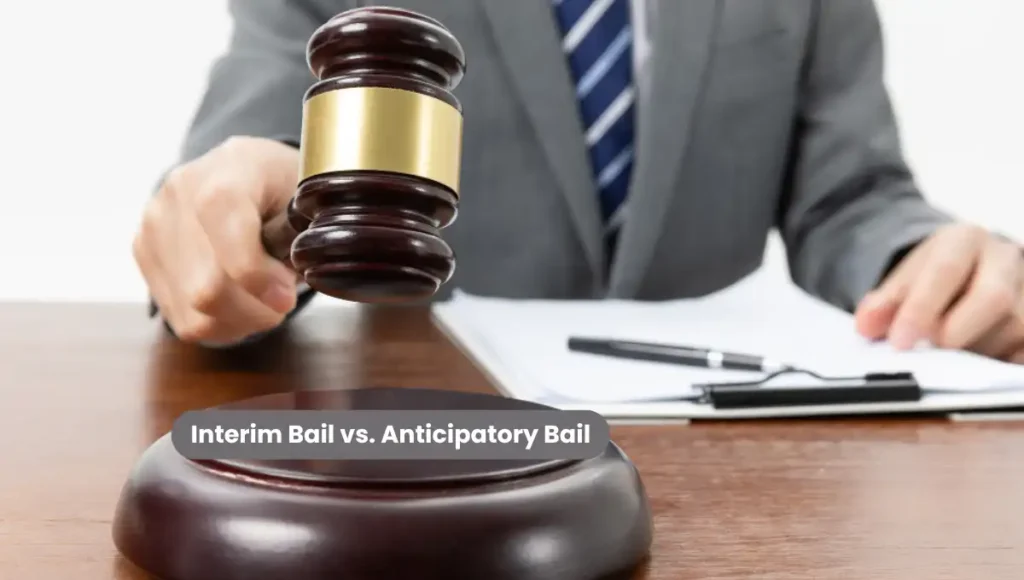In Pakistan’s criminal justice system, bail serves as a critical mechanism to balance an individual’s right to liberty with societal interests in justice.
Among the various forms of bail, interim bail and anticipatory bail are often conflated due to their shared goal of preventing unnecessary detention.
However, these legal remedies differ significantly in application, scope, and purpose. This guide clarifies their distinctions, helping individuals navigate their rights effectively.

Understanding Interim Bail: Temporary Relief During Legal Proceedings
Interim bail refers to a short-term judicial order that temporarily releases an accused person from custody while their primary bail application is under consideration. It acts as a provisional measure to prevent undue incarceration during procedural delays.
Key Characteristics of Interim Bail
- Temporary Duration: Granted for a limited period (e.g., days or weeks) until the court reviews the regular bail plea.
- Urgent Relief: Often sought when there’s imminent risk of arrest or prolonged detention.
- Judicial Discretion: Courts assess factors like offense severity, flight risk, and public safety before granting interim bail.
- Convertible to Regular Bail: If the court approves the primary bail application, interim bail may transition into regular bail.
Example: If an individual is arrested in a non-bailable case and needs time to gather evidence for their defense, interim bail ensures they aren’t jailed during this period.
Anticipatory Bail: Pre-emptive Protection Against Arrest
Anticipatory bail in Pakistan is not explicitly codified under the Code of Criminal Procedure (CrPC) but is granted through judicial precedents and inherent powers of higher courts.
It allows individuals to seek legal protection before an arrest, particularly in cases of false accusations or politically motivated charges.
Core Features of Anticipatory Bail
- Pre-arrest Safeguard: Filed when someone anticipates arrest for a non-bailable offense.
- Conditions Imposed: Courts may mandate cooperation with investigations, travel restrictions, or regular court appearances.
- Duration Flexibility: Can last until the trial concludes or for a court-specified period.
- Higher Court Jurisdiction: Typically granted by High Courts (e.g., Lahore High Court, Sindh High Court) under constitutional protections.
Example: A journalist fearing arrest over a controversial report might secure anticipatory bail to avoid detention while the case is investigated.
Legal Elements Governing Interim and Anticipatory Bail
Interim Bail Requirements
- Immediate Threat: The accused must demonstrate urgent need to avoid custody.
- Pending Bail Application: Interim relief is linked to an ongoing regular bail plea.
- Judicial Prudence: Courts evaluate the accused’s criminal history, evidence strength, and societal impact.
Anticipatory Bail Criteria
- Credible Apprehension: The applicant must prove a genuine fear of arrest.
- Non-bailable Offense: Applies only to charges classified as non-bailable under Pakistani law.
- Public Interest: Courts ensure granting bail doesn’t hinder investigations or endanger witnesses.
Purpose and Impact on Legal Rights
Role of Interim Bail
- Prevents Unjust Detention: Ensures individuals aren’t jailed unnecessarily during legal formalities.
- Facilitates Fair Trials: Allows the accused to consult lawyers, gather evidence, and prepare defenses.
- Judicial Efficiency: Grants courts time to evaluate complex bail applications thoroughly.
Significance of Anticipatory Bail
- Upholds Presumption of Innocence: Protects individuals from stigmatization and harassment pre-trial.
- Deters Malicious Prosecution: Shields against false charges meant to tarnish reputations.
- Safeguards Fundamental Rights: Aligns with Article 9 and 10 of the Pakistani Constitution, ensuring the right to security of person and safeguards against arbitrary arrest.
Key Differences Between Interim and Anticipatory Bail
| Aspect | Interim Bail | Anticipatory Bail |
| Legal Basis | Courts’ inherent powers under CrPC. | Judicial precedents and constitutional rights. |
| Timing | Post-arrest, during pending bail hearings. | Pre-arrest, based on arrest anticipation. |
| Duration | Short-term (days/weeks). | Long-term (until trial ends or court orders). |
| Applicability | Bailable and non-bailable offenses. | Exclusively non-bailable offenses. |
| Granting Authority | Magistrates, Sessions Courts, High Courts. | High Courts primarily. |
If you’re considering a career in law, learn about the scope of an LLB degree in Pakistan and its career opportunities.
FAQs:
Q1: Can interim bail be extended in Pakistan?
Yes, courts may extend interim bail based on case complexity or delays in regular bail hearings.
Q2: Is anticipatory bail applicable across all provinces?
High Courts in provinces like Punjab and Sindh grant anticipatory bail, ensuring nationwide protection.
Q3: What happens if anticipatory bail is denied?
The applicant may be arrested but can still seek regular bail post-arrest.
Q4: Are both bails available for terrorism-related offenses?
Courts scrutinize such cases rigorously, often denying bail due to public safety concerns.
Q5: Can conditions attached to bail be modified?
Yes, courts may revise terms like travel restrictions if circumstances change.

